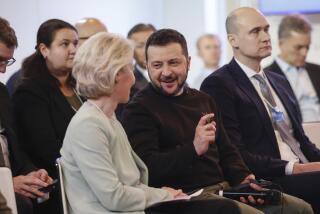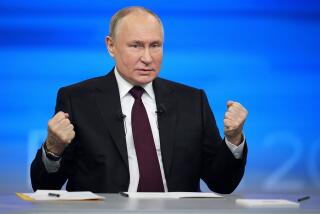Russia’s Business Elite Jeers Speech by Yeltsin : Economy: Laughter greets the president’s contention that inflation slowed in the first quarter. His reaction is confusion.
- Share via
MOSCOW — What began as a dignified speech by the Russian president before a group of the country’s most powerful industrialists quickly dissolved into an embarrassing moment for Boris N. Yeltsin on Friday, as his audience openly scoffed at his assessment of the economic situation.
When Yeltsin tried to tell a gathering of 5,000 of Russia’s most influential business people that the economy is stabilizing and cited figures suggesting that monthly inflation dropped from 27% to 17% in the first quarter of 1993, the audience erupted in laughter. At least one person shouted out, “He’s full of it!”
Twice more, the short speech was interrupted by the mocking crowd.
The speech was not televised, but the afternoon news on Russian Television broadcast a part of the president’s address during which the business executives were ridiculing him and he was looking confused.
“I don’t understand why they’re laughing,” a baffled Yeltsin said, turning to Arkady I. Volsky, the head of the Congress of Industrialists and Entrepreneurs, whose conference the speech was addressed to.
Volsky then spoke to the crowd, sympathizing with them for doubting the “authenticity” of Yeltsin’s figures but asking them to behave as “cultured people.”
Later in the day, the Supreme Soviet, the Russian legislature, ordered a national television channel to preempt its regular programming to show the entire 80 minutes of a speech by Vice President Alexander V. Rutskoi, who is locked in a conflict with Yeltsin over the pace and strategy of economic reforms.
In the defiant speech, Rutskoi declared that he will not quit, although twice in two days Yeltsin mentioned plans to request his resignation.
Rutskoi’s speech seemed aimed directly at discrediting his boss, who in just eight days faces a midterm vote of confidence in his presidency.
Yeltsin has said he will resign unless the majority of voters declare faith in him in the April 25 referendum. If Yeltsin resigned, Rutskoi would take over as president.
Rutskoi listed examples of flagrant corruption under Yeltsin’s rule.
During the presidential campaign of 1991, one of Yeltsin’s most popular themes was his pledge to root out official corruption.
Corruption is now so widespread, Rutskoi said, that in 1992, Russia exported raw materials and other goods worth $38 billion but collected only $11 billion for them.
Rutskoi also cited abuses of humanitarian aid and instances of officials profiting by arms sales.
“Not only military but also high-ranking government officials were known to participate in the plunder,” Rutskoi said.
Calling for a major investigation into such corruption, the vice president said, “Russia must be shown who is really betraying it, who is guilty of ruining the economy--the legislators, or those who are busy . . . robbing the country and violating laws.”
Earlier in the week, Rutskoi published a scathing report saying that Yeltsin’s policies have destroyed the country’s agricultural base.
His office also released a report, which was later denied, that the vice president’s official Mercedes-Benz had been taken from him, indicating that Yeltsin had sunk to petty ways of punishing Rutskoi’s lack of loyalty.
In an expression of contempt for one of Yeltsin’s top appointees, the Supreme Soviet refused to allow Deputy Prime Minister Anatoly B. Chubais, who is in charge of Yeltsin’s policy for selling off state property, to take the podium after Rutskoi finished his speech.
More to Read
Sign up for Essential California
The most important California stories and recommendations in your inbox every morning.
You may occasionally receive promotional content from the Los Angeles Times.













